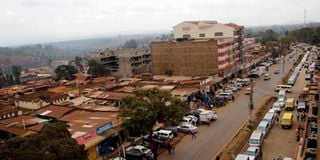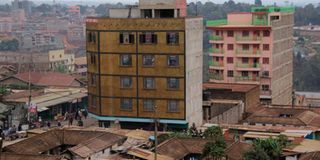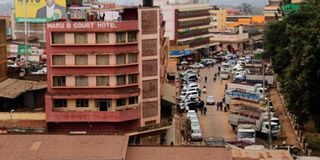Premium
Nyeri: The Mount Kenya town with no mall or pizza shop

Kimathi Street, the main street in Nyeri town.
Had it kept pace with its peers, the likes of Nakuru and Kisumu with which they all served as provincial headquarters, Nyeri town would be among the country’s cities.
But the former central provincial headquarters has lost its mojo, or so it seems.
Situated approximately 120 kilometres north of the Capital Nairobi, the town is grappling with a slow rate of growth.
Now, between it and its peers sits stark differences – from architectural designs to living standards.
Many towns of its stature across the country have been spruced up by various architectural designs. But Nyeri is still stuck in its old self, with old blocks that don’t match the style of business today, dragging it away from her peers.
The town’s Central Business District (CBD) is signified by one-storied buildings of Asian architectural designs, built by Indians during the pre-colonial period. All others are outmoded storey buildings that were constructed in the same period –1970s.

Some highrises coming up in Majengo slums in Nyeri town.
At its downtown, majority of the shops are of the conventional outlook- with a business face at the front and stores at the back.
Only a number of the high-rise buildings in the town have been constructed recently and are modern with lift facilities.
Much of the property in the town is either owned by families or co-operatives.
As such, many of the land-owners have been stopped from developing their properties owing to pending lawsuits involving the properties, conflicts among co-operative members as others prefer to hold onto their estates which they use as collateral while applying for bank loans.
When 26-year-old Dennis Mathenge set out to look for a shop to expand his cosmetic business in Nyeri town, his biggest challenge was the high goodwill that most of his preferred rental spaces came with.
Moreover, many of the buildings he visited were of old architectural designs thus limiting him from starting a modern cosmetic shop.
“Most landlords were not open to the idea of allowing me to revamp their property so as to suit my needs,” he says.
As a result, he was forced to let go of some rental shops which were located in good strategic positions for his business.
But after a year of searching, he finally got a shop next to the town’s Lower Matatu Terminus.
He moved in last year after convincing the landlord to allow him to modernize the building.
“I constructed a rolling steel shutter door, installed floor tiles and glass counters for easy display of my products,” he says.
Mathenge has since agreed with his landlord that if he ever gets to vacate the premises he will reconstruct the shop to its former state at his own cost. Previously, the 30 square feet building hosted a butchery.
In addition to incurring costs in renovating the property, Mathenge was forced to pay a goodwill of a total of Sh1 million to the former tenant and his landlord before occupying the building.
He hopes to recover the amount, probably with a profit from the next tenant when he vacates the premises in future.
His experience, just like many others, is what has kept away entrepreneurs willing to invest in the town.
In his two-year stay at the town, Mathenge says that he has witnessed three buildings being auctioned.
“Most families owning properties in town prefer to hold onto them rather than selling because they are located on prime land and can be used as securities,” he explains.
The high price of land in the town is favourable to such property owners.
Currently, an acre of a land goes for Sh10 million compared to land in nearby towns such as Nanyuki in which an acre is selling at Sh8 million.
A number of buildings at the town are also gazetted as national monuments although they are privately owned.
The National Museums and Heritage Act (2006) prohibits such owners from demolishing such houses or doing repair works without permission from the National Museums of Kenya (NMK).
Karanja Wanjera has witnessed the town bloom in his childhood and in his old age he is again observing the town's dwindling fortunes.
The 68-year-old reminisces how the now sleepy town once burst with activities in its heydays as the provincial headquarters.
“The presence of the national government offices and corporate branches had spurred the growth of many businesses making the town a commercial centre,” he says.
But devolution saw such entities open offices in nearby counties and surrounding towns, ultimately making counties to keep businesses within themselves.
Besides being an administrative centre, Mr Wanjera says that the town had been known for agriculture-with the main crops being coffee and tea, since the post-colonial era.
A period he recalls was marked with good pay and frequent bonuses, leading to the development of many farmers’ co-operatives which bought properties in town and started businesses. Such businesses are currently owned by the third generation of the original owners.
“But currently, the tea and coffee sectors are dwindling and are not sustaining the town as major economic activities,” he says.

A view of a section of Nyeri town.
The Kenya National Chambers of Commerce and Industry (KNCCI) Nyeri chairperson Ibrahim Ndegwa says that the attention that the town formerly attracted has since shifted to its satellite towns - Chaka and Othaya.
Within the last five years, the two satellite towns have benefitted from major government infrastructural projects which have boosted their economic development.
Chaka which lies about 150 km from Nairobi on Great North Road, has benefitted from a Sh1 billion market complex and the revival of the Nairobi- Nanyuki railway line through the construction of the Chaka Railway Station.
While Othaya is reaping from the opening of a Level 6 Hospital-The Mwai Kibaki Hospital, which is a branch of Kenyatta National Hospital.
The town is also home to several colleges and coffee and milk processing plants.
“Nyeri town has been left out because it lacks room for future expansion as there is no space for large investments such as factories because residents are building residential houses even in its outskirts,” he says.
Mr Ndegwa says that the town’s poor planning has also made the town congested, pushing away international investors who would have otherwise occupied the few modern high-rise buildings in the town.
“Lack of parking spaces has always been an issue to international businesses intending to invest in the town,” he adds
But the County Chief Officer in charge of the Ministry of Lands and Planning in Nyeri, Ms Beatrice Koech, disagrees saying that the town is well planned.
“The challenge has always been relocating the overwhelming number of traders who have set up structures on major roads and streets thus causing overcrowding,” she says, adding that the town has also been burdened by an increasing number of taxis which park along major buildings.
So as to decongest the town, she says the county, through the Kenya Urban Support Programme, is completing the construction of a Sh600 million Matatu terminus at Asian Quarters.
“Once complete, the terminus will have parking space for lorries, matatus and taxis, 1,000 business stalls, a garage, an open air market and a Kenya Power substation,” says Ms Koech.
The county is also sensitizing property owners to build modern establishments before approving their construction designs.
“We are also ensuring that such development approvals take the shortest time so as to create an attractive business environment,” she says, adding that within the past year entrepreneurs have benefitted from incentives such as reduced house licences.
Despite its slow growth rate, Ms Koech says that Nyeri will still be marketed as an administrative centre since it still hosts most of the government offices.
Currently, the county is banking on a trend that has seen more city dwellers relocate to rural areas since the onset of the pandemic period.
Since 2020, the county has recorded about a 30 percent increase in the number of private homes being built.
“This has introduced an unrealized market potential which will see a modern revamp of the town because of the new young population,” she says.





